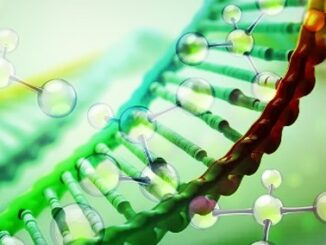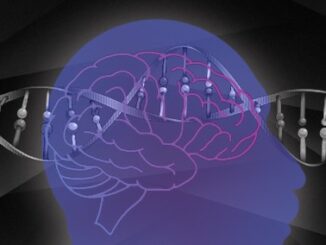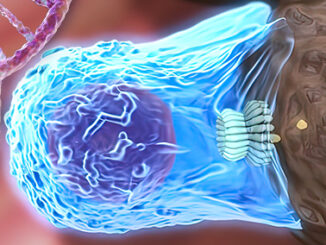Articles that explore the connection between epigenetics and diseases and disorders, including cancer, cardiovascular disease, diabetes, autoimmune disease, and more.
Colorectal cancer ranks as the second leading cause of cancer-related deaths in the United States, presenting a multifaceted challenge influenced by both genetic and environmental factors. Despite advancements in treatment, there remains a pressing need for innovative therapies, particularly as cases rise among younger adults and at advanced disease stages. One promising approach lies in epigenetics, the study of chemical modifications on DNA and its packaging proteins that influence gene expression without altering the DNA sequence. Cancer cells often display [more…]
Alzheimer’s disease is a degenerative brain disorder that impacts millions globally. While the exact cause of the disease is still unknown, a recent study by Northwestern University (NU) has shed light on the potential role of epigenetic modifications in the immune system of Alzheimer’s patients. The study found that Alzheimer’s patients experience epigenetic changes in their blood’s immune system, which could be influenced by environmental factors, past infections, and lifestyle behaviors. These findings could pave the way for the development [more…]
Cleft lip and palate stand out as the most prevalent craniofacial birth anomalies worldwide, affecting approximately 1 in 700 newborns. Despite extensive research spanning decades, the precise etiology of most cases remains elusive, as does effective preventive measures. Understanding the causes of this abnormality has mainly focused on genetic factors, revealing numerous risk loci along the DNA, although direct causative variants are rare. Therefore, it is thought that this defect arises from a mix of genetic and environmental factors. Yet, [more…]
Diabetes is a widespread health issue that affects millions of people worldwide. The disease is complex and can develop due to a combination of genetic and lifestyle factors. Given its increasing prevalence, scientists worldwide are investigating the underlying genetic complexities and epigenetic factors of diabetes in more detail. One question that researchers are interested in is whether epigenetic changes cause type 2 diabetes or if the changes occur only after a person has become ill. A new study by Lund [more…]
Advancements in technology have opened doors for scientists to delve deep into the complex world of genetic control elements, unveiling the intricate mechanisms governing gene activation within our genetic code. Contrary to the simplistic perception of cis-regulatory elements (CREs) as mere genetic on/off switches, emerging evidence underscores their capacity for nuanced behaviors. They’re not just toggles for gene enhancement; they orchestrate complex functions pivotal to sustaining cellular health. New research originating from Japan has uncovered about 11,000 significant genetic switches, [more…]
Obesity stands as a multifaceted health concern affecting millions worldwide. While diet and lifestyle play pivotal roles, researchers are now looking much deeper to determine if susceptibility to obesity could be identified at a molecular level within human cells. In a recent study led by distinguished biology professor Michael Skinner at Washington State University (WSU), a comprehensive twin study was undertaken to probe the epigenetic factors associated with obesity. Their findings uncovered specific DNA methylation regions (DMRs) intricately connected to [more…]
Understanding the intricate interplay between genetics and cancer progression has long captivated the scientific community. While genetic mutations have been the main focal point in oncology, recent strides have illuminated the profound influence of epigenetic modifications in the development of cancer. In a recent study published in the journal Nature, Dr. Eduard Porta from the Josep Carreras Leukaemia Research Institute and his team have shed light on the pivotal role that epigenetics plays in steering cells on their journey from [more…]
Artificial intelligence (AI) holds immense potential to transform healthcare by unraveling intricate patterns within complex biological data, laying the foundation for personalized medical solutions. Researchers at Linköping University in Sweden have pioneered an AI-driven method to analyze epigenetic data, with wide-ranging applications in medicine and biology. Their advanced models not only accurately estimate individuals’ chronological age but also discern their smoking history. In the realm of genetics, numerous factors come into play, dictating which genes are activated or deactivated at [more…]
In the ongoing pursuit of understanding Alzheimer’s disease (AD), scientists are taking a closer look at the genetic landscape. Their investigation has revealed thousands of genetic variants linked to AD, many of which were once overlooked as non-coding regions of the genome. Recent advancements in the field of epigenetics have illuminated the critical role these non-coding variants play in gene regulation. However, how these gene changes affect Alzheimer’s risk and brain cells is still unclear. Researchers from the University of [more…]
One remarkable trait of the immune system is its ability to remember past encounters with harmful pathogens, like viruses, parasites, and bacteria. The memory of these foreign agents, or “antigens” as they are called in scientific terms, allows for a swifter, more effective response if they happen to reappear. While immune memory is the basis of how vaccines work, the intricate underlying mechanisms and the causes of dysfunctional immune responses remain areas of active scientific exploration. In a recent study [more…]










